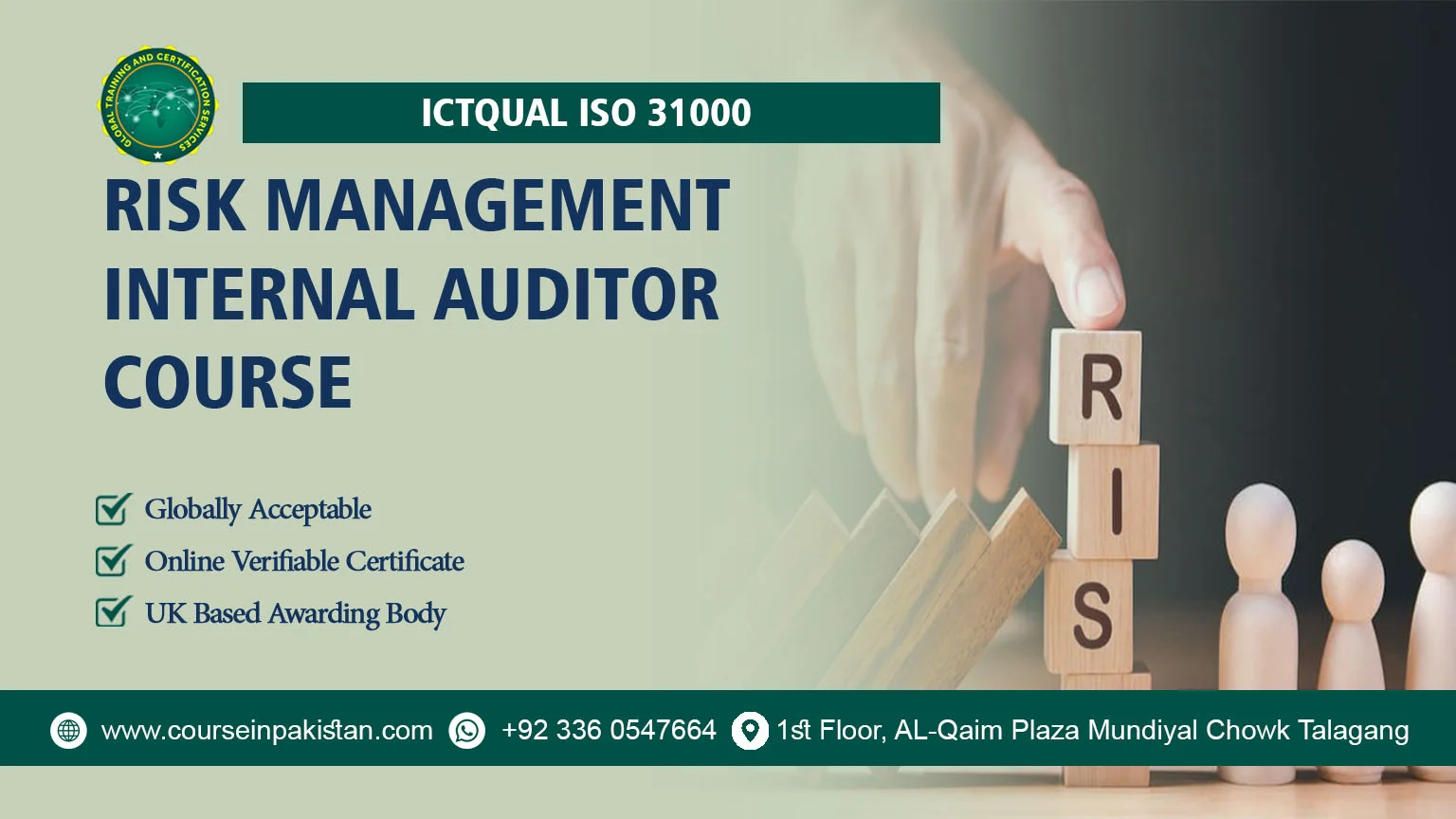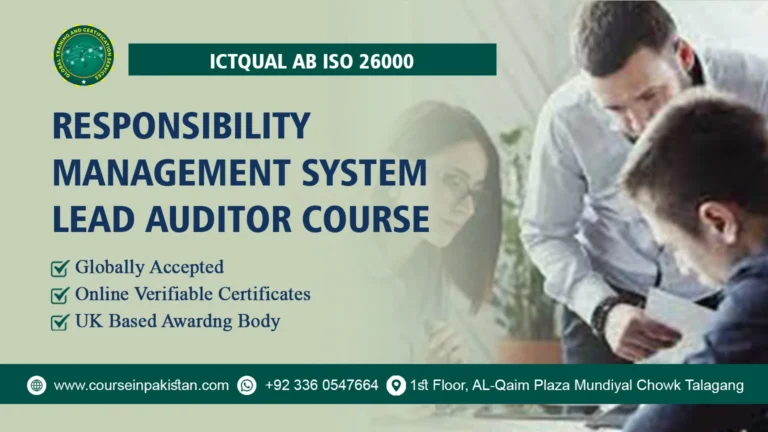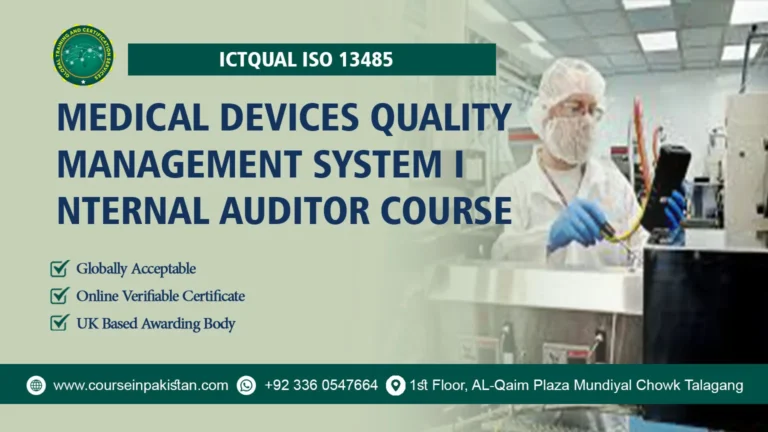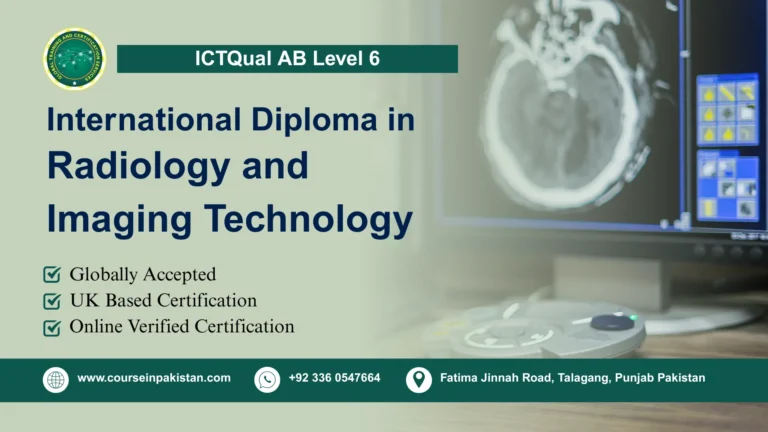
ICTQual ISO 31000 Risk Management Internal Auditor Course
In today’s complex and uncertain business landscape, effective risk management is crucial for organizations to navigate challenges, seize opportunities, and protect their interests. The ISO 31000 Risk Management Internal Auditor Course equips participants with the knowledge and skills to assess, monitor, and manage risks systematically within their organizations. This course is designed to provide a comprehensive understanding of risk management principles, methodologies, and best practices as outlined in the ISO 31000 standard.
Course Overview
The ISO 31000 Risk Management Internal Auditor Course covers essential topics to enable participants to conduct rigorous internal audits of their organization’s risk management framework. Participants will learn to apply ISO 31000 principles to identify, analyze, evaluate, treat, and monitor risks effectively. Practical exercises and case studies will enhance their ability to assess risk management processes, identify areas for improvement, and recommend strategies to strengthen organizational resilience.
Course Benefits
- Enhanced Risk Awareness: Gain a deep understanding of risk management principles and best practices, enhancing awareness of potential threats and opportunities.
- Improved Decision-Making: Develop skills to assess risks objectively and make informed decisions that align with organizational objectives.
- Compliance Assurance: Align risk management practices with ISO 31000 standards to ensure compliance and adherence to international best practices.
- Organizational Resilience: Strengthen organizational resilience by implementing effective risk mitigation strategies and contingency plans.
- Career Advancement: Expand career opportunities in risk management, internal auditing, and compliance roles focused on ISO 31000 standards.
Course Study Units
The course typically includes the following study units:
- Introduction to Risk Management
- Fundamentals of Internal Auditing
- ISO 31000 Requirements and Framework
- Risk Identification and Assessment Techniques
- Risk Treatment and Control Measures
- Conducting Risk Management Audits
- Reporting and Follow-Up
- Continuous Improvement and Professional Development
Learning Outcomes
Introduction to Risk Management
Learning Outcomes:
- Understand the importance of risk management in organizational success and resilience.
- Define key concepts and terminology related to risk management.
- Recognize the benefits of implementing a structured risk management approach according to ISO 31000.
2. Fundamentals of Internal Auditing
Learning Outcomes:
- Describe the role and objectives of internal auditing within the context of risk management.
- Identify the principles and standards guiding internal auditing practices.
- Apply auditing principles to evaluate risk management processes effectively.
3. ISO 31000 Requirements and Framework
Learning Outcomes:
- Gain a comprehensive understanding of the ISO 31000 standard and its principles.
- Interpret the guidelines and recommendations provided by ISO 31000 for effective risk management.
- Align organizational risk management practices with ISO 31000 to enhance consistency and reliability.
4. Risk Identification and Assessment Techniques
Learning Outcomes:
- Apply various techniques for identifying risks within organizational contexts, such as brainstorming, SWOT analysis, and scenario analysis.
- Conduct risk assessments to evaluate the likelihood and impact of identified risks on organizational objectives.
- Prioritize risks based on their significance and potential consequences to facilitate informed decision-making.
5. Risk Treatment and Control Measures
Learning Outcomes:
- Develop risk treatment strategies and control measures to mitigate identified risks.
- Implement risk response plans to reduce the likelihood or impact of risks.
- Monitor and review the effectiveness of risk treatments to ensure alignment with organizational goals and objectives.
6. Conducting Risk Management Audits
Learning Outcomes:
- Plan and prepare for risk management audits, including defining audit scope, objectives, and criteria.
- Conduct audits systematically to assess the implementation and effectiveness of risk management processes.
- Engage with stakeholders to gather audit evidence, validate findings, and ensure comprehensive coverage of risk management activities.
7. Reporting and Follow-Up
Learning Outcomes:
- Prepare clear and concise audit reports that communicate audit findings, conclusions, and recommendations.
- Provide actionable insights and improvement opportunities based on audit results to support organizational decision-making.
- Monitor and track the implementation of corrective actions and risk management enhancements to address identified weaknesses.
8. Continuous Improvement and Professional Development
Learning Outcomes:
- Implement continuous improvement practices in risk management to adapt to changing organizational needs and evolving risk landscapes.
- Engage in professional development activities, such as training workshops and industry certifications, to enhance knowledge and skills in risk management.
- Foster a culture of proactive risk management and resilience within the organization through ongoing learning and knowledge sharing.
By mastering these learning outcomes across the study units of the ISO 31000 Risk Management Internal Auditor Course, participants will acquire the knowledge and skills necessary to effectively assess, monitor, and manage risks within their organizations. This expertise enables organizations to enhance their resilience, protect their assets, and capitalize on opportunities for sustainable growth in an increasingly competitive and unpredictable business environment. The course is essential for professionals involved in risk management, internal auditing, or compliance roles, preparing them to lead and support risk management initiatives aligned with international standards and best practices.
Who is This Course For?
This course is ideal for:
- Risk Managers: Responsible for identifying, assessing, and mitigating risks across the organization.
- Internal Auditors: Seeking to specialize in auditing risk management practices and processes.
- Compliance Officers: Ensuring adherence to ISO 31000 standards and regulatory requirements related to risk management.
- Business Continuity Managers: Involved in developing continuity plans based on risk assessments.
Future Progression for This Course
After completing the ISO 31000 Risk Management Internal Auditor Course, participants can pursue further professional development and career advancement opportunities, such as:
- Certified Lead Auditor: Advance to become a certified lead auditor for ISO 31000, capable of leading audits for certification purposes.
- Advanced Risk Management Training: Explore specialized courses in advanced risk assessment techniques, crisis management, or enterprise risk management.
- Consultancy and Advisory Roles: Provide expert advice on risk management strategies and ISO 31000 compliance to organizations globally.
- Organizational Leadership: Take on leadership roles in risk management, guiding strategic initiatives for enhancing organizational resilience and risk mitigation capabilities.
ISO 31000 Risk Management Internal Auditor Course empowers participants to play a pivotal role in enhancing organizational resilience and ensuring sustainable business performance through effective risk management practices. By mastering ISO 31000 principles and methodologies, professionals can contribute to building a proactive risk culture within their organizations, safeguarding assets, and maximizing opportunities for growth in an increasingly competitive global landscape. This course is essential for anyone involved in risk management, internal auditing, or compliance roles, preparing them to lead and support risk management initiatives aligned with international standards and best practices.






